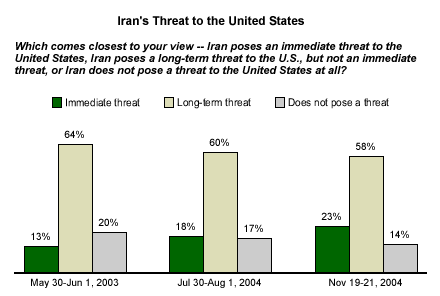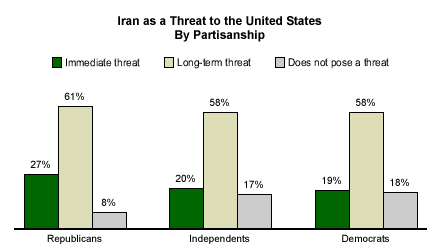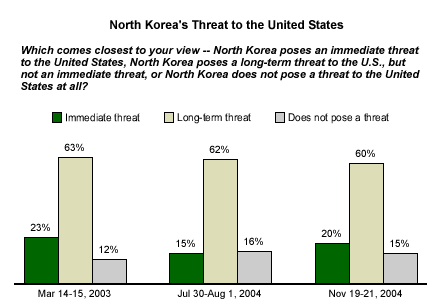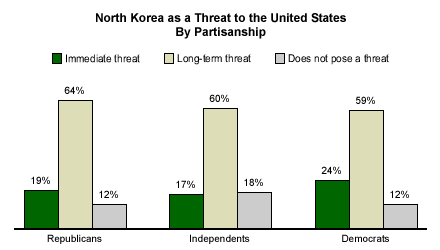Americans see Iran and North Korea as posing similar threats to the United States. A majority of Americans say that both nations, which President George W. Bush included in the "axis of evil" along with Iraq, represent long-term threats to the United States, but only about one in five Americans describe these countries as immediate threats.
Iran
A CNN/USA Today/Gallup poll conducted Nov. 19-21*, shows 23% of Americans say Iran poses an immediate threat to the United States. A majority of Americans, 58%, say it poses a long-term threat, and only 14% say Iran does not pose a threat at all.
Gallup has asked this question three times over the past two years. In May/June 2003, only 13% of Americans said Iran posed an immediate threat. This percentage increased to 18% in July/August 2004, before edging up to 23% in the most recent survey.
Juan Cole, a professor of modern Middle Eastern and South Asian history at the University of Michigan, believes the Iraq war may have affected perceptions of Iran. "It seems clear that more Americans now than before the Iraq war feel that Iran is an immediate threat, and fewer feel that it is no threat at all," Cole says. "But the big majority of about 60% who say that it is a long-term but not an immediate threat, has remained pretty stable … These poll results suggest that any large-scale U.S. action against Iran would be hard to sell to the public and to Congress at this point."

The current poll finds that 27% of Republicans say Iran is an immediate threat, while 61% say it is a long-term threat and 8% say it is not a threat at all. Among Democrats, just 19% say Iran poses an immediate threat, compared with 58% who say it is a long-term threat and 18% who say it is not a threat at all.

North Korea
With regard to Kim Jong Il's regime in North Korea, the numbers are similar: One in five Americans (20%) say North Korea poses an immediate threat to the United States, while a majority of Americans -- 60% -- say the communist state poses a long-term threat, and 15% say it does not pose a threat at all.
In 2003, 23% of Americans rated North Korea as an immediate threat. This percentage was 15% in late July/early August of this year. The percentage rating North Korea as a long-term threat or as no threat at all has remained fairly stable over these past three polls.

Even though there are some slight partisan differences on views of North Korea, the differences are not nearly as large as those regarding Iran. Nineteen percent of Republicans say North Korea poses an immediate threat, while 64% say it is a long-term threat, and 12% say it is not a threat at all. Nearly one in four Democrats (24%) view North Korea as an immediate threat, 59% say it is a long-term threat, and 12% say it is not a threat at all.

The increase in the percentage of Americans rating North Korea as an immediate threat comes primarily from Democrats and independents. In July/August 2004, 14% of Democrats said North Korea was an immediate threat, compared with 24% most recently. This percentage also increased among independents, from 10% to 17%. The results show little change among Republicans.
Bottom Line
Historically, Americans have not rated Iran and North Korea very highly. Gallup annually asks Americans to rate their impressions of various nations across the globe as favorable or unfavorable. Most recently, in February 2004, Iran and North Korea, along with the Palestinian Authority, ranked at the bottom of the list of 22 nations. Only 17% of Americans have a favorable view of Iran, while 77% have an unfavorable view. Just 12% favorably rate North Korea, while 83% rate it unfavorably.
*Results are based on telephone interviews with 1,015 national adults, aged 18 and older, conducted Nov. 19-21, 2004. For results based on the total sample of national adults, one can say with 95% confidence that the margin of sampling error is ±3 percentage points.
